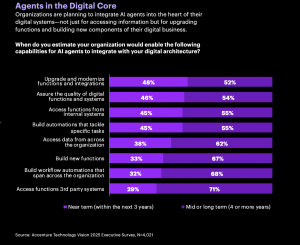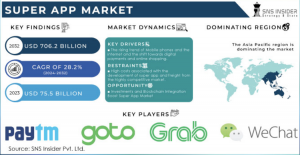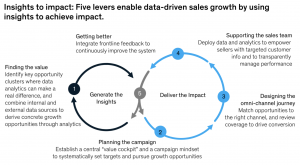10 Digitalization Trends That Will Transform Business in 2025
In 2025, businesses are entering a phase of active transformation, where digitalization is no longer just a buzzword—it’s the key to resilience, competitiveness, and growth. Companies that invest in digital technologies today will outpace their competitors tomorrow.
Based on research from Gartner, McKinsey, IBM, Deloitte, and our own expertise at InDevLab, we’ve identified 10 key digitalization trends that will shape the future of business in 2025.
1. Vertical AI
In 2025, Artificial Intelligence is evolving from a general-purpose assistant into an industry-specific expert. We’re witnessing rapid growth in AI solutions tailored to medicine, law, logistics, finance, and even agriculture. These AI systems are trained on specialized datasets and understand the context deeper than any universal tool.
For example, legal AI can analyze contracts and highlight risks in seconds. Medical AI suggests diagnoses by comparing symptoms with millions of cases. In agriculture, AI predicts yields based on satellite data. These systems don’t replace human experts—they amplify them. And that’s where the future lies.
Examples of adoption:
- Legal AI assistants
- AI diagnostics in healthcare
- Predictive analytics in agriculture
At least 29% of companies will adopt vertical AI solutions in 2025 by Accenture report.

“3 out of 4 C-suite executives believe that if they don’t scale artificial intelligence in the next five years, they risk going out of business entirely.”
2. Digital Twins 2.0 (Digital Twin + IoT + AI)
A digital twin isn’t just a 3D model—it’s a smart digital copy of an object that updates in real time thanks to IoT, sensors, and AI. With digital twins, companies can monitor how equipment, buildings, processes, or even entire cities operate.
Imagine a factory that “predicts” its own failures, or a city that adjusts lighting and traffic based on real-time digital models. These systems save resources and drastically improve decision-making, asset management, and production control.
Applications:
- Smart cities
- Industry and manufacturing
- Energy and logistics
The digital twin market is expected to reach $110 billion by 2028 – MarketsandMarkets – Digital Twin Growth
3. Decentralized Digital Identity (eID & SSI)
In a digital world, identity verification is critical—especially for access to financial services, government platforms, and sensitive data. Digital identity (eID) and decentralized solutions (SSI) allow individuals to prove who they are—quickly and securely—without paper documents or passport scans.
Especially the EU is rolling out a digital wallet to store IDs, licenses, and diplomas. These technologies are already being implemented in Europe via the EUDI Wallet, which can store digital IDs, driver’s licenses, diplomas, and even bank details. This streamlines processes for both citizens and businesses.
For HR: instant document verification during hiring.
For banks: reduce KYC processes from weeks to minutes.
For government: build trust and transparency.
4. Next-Generation Security: Zero Trust & NIS2
Security can no longer be based on the principle “trust if internal.” Zero Trust Architecture requires verifying every device, user, and app—regardless of whether it’s inside the network. This becomes even more vital with the NIS2 directive, which significantly raises cybersecurity standards across the EU.
Zero Trust is more than firewalls—it includes network segmentation, endpoint protection, multi-layer authentication, and AI-driven threat response. Companies adopting this model drastically reduce incidents and data breaches.
Why it matters:
- NIS2 enforcement in the EU
- Rise in supply chain attacks
- More remote and hybrid work
“Average cost of a data breach in 2024 was $4.88 million”
If you’re looking to prepare your organization for the new NIS2 directive, now is the time to act. At InDevLab, we help companies assess their cybersecurity readiness and implement the technical and organizational measures required for compliance.
To make it easier, we’ve also prepared free NIS2 compliance templates that you can download and adapt to your organization’s needs.
Or read our article NIS vs NIS2: Key Differences Explained for EU Cybersecurity Compliance
5. Low-Code/No-Code Platforms
While some companies hunt for developers, others build business apps themselves—thanks to low-code and no-code platforms. These are visual environments where you can create internal portals, CRMs, or document management systems in just a few hours—without writing a single line of code.
These platforms solve a key challenge: fast, cost-effective process automation without dependency on the IT department. They’re especially popular in HR, finance, logistics, and operations.
Popular platforms:
- Microsoft PowerApps
- Creatio
- OutSystems
“By 2026, 80% of corporate apps will be built by non-tech professionals (Gartner)“
6. ESG Tech and Sustainability as Digital Strategy
ESG automation and planning is the #1 B2B trend, according to Deloitte.
In 2024, the EU’s CSRD regulation came into effect, requiring companies to report on ESG metrics—environmental impact, social responsibility, and corporate governance. Businesses can no longer ignore CO₂ emissions, sourcing, or labor conditions in their supply chains.
Enter ESG Tech: digital platforms that collect data, analyze risks, generate reports, and integrate with suppliers. These aren’t “nice-to-haves”—they’re regulatory, investor, and customer requirements
7. Digital Mental Health and Well-Being
Employee mental health is no longer just an HR concern—it’s a productivity factor. Post-pandemic remote and hybrid work models have led to burnout, anxiety, and lower engagement.
Today, AI solutions for mental health are being introduced in the workplace—from chatbots that help with stress to team mood analytics based on surveys and behavior patterns. This improves retention and fosters a healthy work culture.
Digital solutions:
- AI-powered therapy
- Mood-tracking platforms
- Well-being portals embedded in corporate culture
8. Vertical SuperApps for Business
SuperApps are no longer just for banks and marketplaces—they’re entering B2B. Industry-specific SuperApps serve as a single interface for all core tasks of a given profession—from scheduling and workflows to CRM, analytics, and communication.
Imagine a doctor opening their SuperApp to see patient data, history, tasks, messages, and reports—all in one place. Or a logistics manager handling routes, cargo, and documents on a single platform.
Examples:
- SuperApp for doctors
- SuperApp for construction
- SuperApp for lawyers

SuperApp open new market for classical apps and new economical models for B2B monetization and digital ecosystems.
Contact us and know more how InDevLab could help you to develop your new Super App and scale digital ecosystem.
9. Predictive Analytics: Data-Driven Decisions
One of the most powerful digitalization tools in 2025 is predictive analytics and data-driven decision-making. Businesses are moving away from gut-feeling decisions and toward strategies based on real data: customer behavior, market trends, financials, and employee patterns.

AI and machine learning models help forecast demand, optimize inventory, personalize marketing, and assess deal risks. For example, a retailer can predict stockouts, logistics can anticipate traffic delays, and HR can identify team burnout.
“Companies using predictive analytics see 8–10% higher profitability (McKinsey).”
– McKinsey: Analytics Comes of Age
10. Composable Digital Platforms
Modern businesses are moving away from monolithic systems toward modular architectures—Composable Architecture. Think of it like LEGO for enterprise software: independent, interchangeable building blocks.
This approach offers flexibility, faster time-to-market, and the ability to adapt quickly. New features can be added in days, not months. Especially relevant for e-commerce, logistics, fintech, and B2B services.
“By 2026, 60% of organizations will use composable applications as the foundation of their digital strategy (Gartner).“
– Gartner: Composable Applications
📣 Ready to embrace innovation?
InDevLab is your innovative partner that implement business-focused solution with focus on cybersecurity and scalability. We help organisation to
- Integrate AI into business processes
- Ensure compliance with NIS2 and Zero Trust architecture
- Build corporate IT systems and Super Apps
- Support IT infrastructure and corporate resources for high level performance
Contact us to assess your company’s digital transformation journey.



